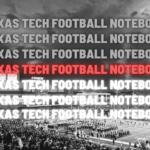Associated Press’ Stephen Hawkins writes about the Big 12 press conference held on Tuesday where Big 12 Commissioner Bob Bowlsby said that the overall revenue is about $50 million short, but given the past year’s uncertainties everyone is willing to take what was available:
“Looking at it at this time last year or even a couple, three months later than this, if we could have signed up for $35 million, we would have done it in a heartbeat,” Bowlsby said.
While acknowledging there are still variables and unknowns, Bowlsby anticipates Big 12 revenue distribution pushing above $40 million per school next year.
The revenue shortfall of about $50 million this school year was primarily because of reduced money from TV contracts, lower ticket sales and not having a team in the College Football Playoff. There were restrictions on the number of the fans, if any, who could attend games. There were also fewer games to televise during football season.
There was also a note about how the SEC last week gave institutions an additional $23 million, but I had not realized that the SEC borrowed against the money that they expect to make from media rights in 2025. The Big 12 decided not to do that.
Heartland College Sports’ Pete Mundo with the bit that was originally from Avalanche-Journal’s Don Williams, which is that the Big 12 television partners were not ready to start negotiations for extensions to the current deal, which goes on for 4 more years to 2025:
“The general result is that, at this time, with so much uncertainty in the media marketplace as well as the landscape for collegiate athletics,” Schovanec said, “our partners, ESPN and FOX, are not interested in acting preemptively with regard to our contract. They recognize the importance of our partnership, but there’s just too much uncertainty, and they do have four years to go.”
I’m not particularly surprised by the lack of interest of television partners wanting to enter into early negotiations. Four years is a lifetime in terms of how quickly things are moving. Heck, yesterday, Amazon just bought a movie studio and they also earlier this spring they bought the rights to Thursday Night Football in the NFL. Not only that, but the programs that are part of these conferences may see the money in the Big Ten and SEC and have a long and hard internal discussion about the viability of the Big 12. That’s going to be a very real conversation in the coming years, you can pretty well bank on that.
![]()
ESPN’s Alex Scarborough writes about the new normal for college coaches, which is tampering with current players at other programs and then contacting their high school coaches to let those players know that they have a spot for said player.
A former four-star athlete told VanHaaren he wouldn’t have entered the portal this offseason if he hadn’t known ahead of time that he would have his choice of landing spots. His high school coach had received calls from college coaches asking whether he was happy weeks before he made public his intent to transfer, he said. And a year before that, players he knew from high school were calling to say, “I need to come over there and join them.”
Coaches recognize this shifting reality in which they feel that no one’s roster is safe, but there’s also a tacit acknowledgement that to survive, one has to play the game.
“You have teams trying to poach kids,” an ACC assistant said. “There’s a lot of shady s— going on.”
There’s a lot to unpack from this article, namely that even with wiretaps for college basketball coaches, the NCAA has no teeth when it comes to punishment for bad behavior and punishment:
Missouri coach Eli Drinkwitz scoffed at the idea of NCAA oversight. It would need to open an investigation, he said, and what good would that do when it still hasn’t punished the coaches implicated in the FBI’s investigation of college basketball?
“What kind of ferociousness is behind the enforcement if you have people on tape admitting to violations and they’re still actively coaching?” Drinkwitz asked.
SMU coach Sonny Dykes brought up those wiretaps, too. He said he believes the NCAA’s inaction is reinforcing the old adage, “If you ain’t cheating, you ain’t trying.”
“You want people in our sport to be ethical enough where they don’t fall prey to that,” Dykes said, “but … you got to win and you got a high-pressure job and you have all these things and then all of a sudden, you look up and you go, ‘Oh, they didn’t punish anybody, and they’re not going to punish me. So why not?'”
Now take this with CBS Sports’ Dennis Dodds who talked to a handful of college coaches about the transfer portal and player compensation and all of the other things that come along with being a head coach.
Basically, the idea is that college coaches aren’t just recruiting high school or junior college players (or maybe even transfers), but they’re also having to recruit their own team, or actually invest in the players at hand. And for players, it is sort of a situation of if they enter the portal they may not find programs busting down their door to sign them up. This is particularly true, I think, for players who have been on the bench for longer than expected and don’t have any tape to show college programs.










